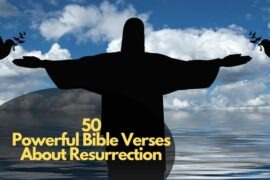Lent was initially designed for new Christians, those who felt a call. They had to prepare for their baptism for 40 days and 40 nights. If they still wished to follow Jesus, they would be baptized on Easter Eve as the sun rose in the east, heralding the new day, the new era, opened by the Resurrection.
For them, the powerful importance was to prepare for their vocation as Christians in the same manner that Jesus prepared for His vocation as the Messiah: 40 days of meditation and self-examination.
Eventually, because everyone was baptized as infants, the church adopted the 40 days of Lent as a time of renewal for those already Christians.
As a result, the season of Lent was utilized to renew and recommit to the Christian life, reviewing our lives in light of the One we are called to follow.
Contents
What is the Original Meaning of Lent
In the Christian church, Lent is a penitential preparation for Easter. In Western churches, it begins on Ash Wednesday, six and a half weeks before Easter. It provides 40 days for fasting and abstinence (Sundays are excluded), in imitation of Jesus Christ’s fasting in the wilderness before he began his public ministry.
In Eastern churches, Lent begins on the Monday of the seventh week before Easter and ends on a Friday nine days before Easter. This 40-day “Great Lent” includes Saturdays and Sundays as relaxed short days.
A period of preparation and fasting likely has been observed before the Easter festival since apostolic times. However, the practice was not formalized until the First Council of Nicaea in 325 CE. It was a time of preparation of candidates for baptism and a time of penance for grievous sinners who were excluded from Communion and were preparing for their restoration.
As a sign of their penitence, they wore sackcloth and were sprinkled with ashes. This form of public penance began to die out in the 9th century. It became customary for all the faithful to be reminded of the need for penitence and their mortality by receiving a memento mori in the form of ashes on their foreheads on the first day of Lent—hence the name Ash Wednesday.
Spiritual Meaning of Lent
Lent is a practice observed by some Christians. The holy month of lent is when an item of food is given up (not eaten) throughout the month. Lent is a time to reflect on earthly desires, sinful nature, and what Jesus did for us, His sacrifice for our sins.
Lent is a spiritual commitment that Christians of certain denominations practice in preparation for Easter. Lent is about walking closer to God, practicing prayer, fasting, and generosity.
Meaning of Lent Catholic
What is the Purpose of Lent
Let’s objective is to prepare Christians for Easter, which honors Jesus Christ’s resurrection. Lent is a season of introspection, repentance, and spiritual rejuvenation.
During this time, Christians are encouraged to fast, pray, and engage in acts of charity and self-sacrifice. They want to grow in their faith, become closer to God, and purify their hearts and souls.
Lent is also a time to reflect on Jesus’ sacrifice for humanity by dying on the cross. Christians strive to imitate Christ’s selflessness and progress in their comprehension of his teachings via their sacrifices and deeds of self-denial.
Finally, the goal of Lent is to strengthen Christians’ faith and prepare them to enjoy the joy of Easter thoroughly.
Who Celebrates Lent
Most Christian groups, including Roman Catholics, Episcopalians, Presbyterians, Methodists, and Lutherans, practice Lent. Historically, it has not generally been practiced by Baptists.
It is a time of spiritual reflection, self-examination, and preparation for Easter, the most important holiday in the Christian faith.
FAQs
What is the True origin of Lent?
Fasting rules were strict in the early centuries, as in Eastern churches. One meal a day was allowed in the evening, and meat, fish, eggs, and butter were forbidden. The Eastern church also restricts the use of wine, oil, and dairy products.
In the West, these fasting rules have gradually been relaxed. The strict law of fasting among Roman Catholics was dispensed with during World War II, and only Ash Wednesday and Good Friday are now kept as Lenten fast days.
However, the emphasis on penitential practice and almsgiving remains, and many Catholics also observe a meatless fast on Fridays during Lent.
In addition, Catholics and other Christians often choose to give up specific pleasures, such as sweets, alcohol, or social media, during Lent as a way to foster simplicity and self-control; many use their cravings or desires for these items as a reminder to pray and to refocus on spiritual matters.
What does the Bible say about Lent?
Many choose to observe Lent with fasting and prayer. The act of fasting is simply abstaining from something to focus on something else. When we give up something, such as food, social media, or TV, we are given time to reflect on our faith and grow our relationship with God.
As we sacrifice something we often turn to, we remember the sacrifice of Jesus Christ. Fasting and prayer during Lent also symbolize the 40 days and nights Jesus fasted in the desert as the devil tempted him.
Through Lent, we realize our own sins, connect with Jesus during his temptation, and experience freedom from sin through his death and resurrection.
The Old Testament and New Testament give us guidelines and examples for fasting. Whether you observe Lent with daily Scripture reflections or fasting and prayer, we have collected helpful Bible verses for remembering the sacrifice and knowing how to fast.
May these Scriptures encourage your faith and strengthen your relationship with Jesus.
- In the Old Testament, Joel calls for a fast in response to a locust plague: “Blow the trumpet in Zion, declare a holy fast, call a sacred assembly. Gather the people, consecrate the assembly; bring together the elders, gather the children, those nursing at the breast.Let the bridegroom leave his room and the bride her chamber. Let the priests, who minister before the Lord, weep between the portico and the altar. Let them say, ‘Spare your people, Lord. Do not make your inheritance an object of scorn, a byword among the nations. Why should they say among the peoples, “Where is their God?”‘” (Joel 2:15-17)
- Jesus himself fasted for 40 days and nights in the wilderness before beginning his ministry: “Then Jesus was led by the Spirit into the wilderness to be tempted by the devil. After fasting forty days and forty nights, he was hungry.” (Matthew 4:1-2)
- In the Sermon on the Mount, Jesus teaches his followers the proper way to fast: “When you fast, do not look somber as the hypocrites do, for they disfigure their faces to show others they do are fasting. Truly I tell you, they have received their reward in full. But when you fast, put oil on your head and wash your face, so that it will not be obvious to others that you are fasting, but only to your Father, who is unseen; and your Father, who sees what is done in secret, will reward you.” (Matthew 6:16-18)
- In the book of Jonah, the people of Nineveh repent and fast in response to Jonah’s warning of God’s impending judgment: “When Jonah’s warning reached the king of Nineveh, he rose from his throne, took off his royal robes, covered himself with sackcloth and sat down in the dust. This is the proclamation he issued in Nineveh: ‘By the decree of the king and his nobles: Do not let people or animals, herds or flocks, taste anything; do not let them eat or drink. But let people and animals be covered with sackcloth. Let everyone call urgently on God. Let them give up their evil ways and their violence.'” (Jonah 3:6-8)
Did Lent originate from Pagan?
Lent is the “fortieth” day before Easter and is observed in many Christian denominations. This is the six-and-one-half-week period that lasts from Ash Wednesday to Easter Sunday. During Lent, Christians fast and refrain from various pleasures.
This is said to be to prepare to commemorate the passion, death, and resurrection of Christ.
Although the Holy Scriptures do ordain a fasting period in commemorating Christ, this was not the forty-day period known as Lent. In the Book of Leviticus, it is written,
Leviticus 23:26-27
And the Lord spake unto Moses, saying, Also on the tenth day of this seventh month there shall be a day of atonement: it shall be an holy convocation (holy gathering) unto you; and he shall afflict your souls (fast)… –
![What is the original meaning of Lent [Detailed Explanation] Leviticus 23_26-27](https://www.bibleversesnow.com/wp-content/uploads/2023/03/Leviticus-23_26-27.jpg)
Furthermore, Paul prophesied such a doctrine concerning unholy fasting in his epistle to Timothy. I Timothy 4:1-3 reads as follows:
I Timothy 4:1-3
Now the Spirit speaketh expressly, that in the latter times some shall depart from the faith, giving heed to seducing spirits, and doctrines of devils;Speaking lies in hypocrisy; having their conscience seared with a hot iron;Forbidding to marry, and commanding to abstain from meats, which God hath created to be received with thanksgiving of them which believe and know the truth.-
![What is the original meaning of Lent [Detailed Explanation] I Timothy 4_1-3](https://www.bibleversesnow.com/wp-content/uploads/2023/03/I-Timothy-4_1-3.jpg)
Paul is explicitly prophesying the rise of the Catholic faith. In Catholicism, the mother of all other Christian denominations, priests are prohibited from getting married.
In addition, they have instituted a spring fast attributed to the suffering of Christ. However, such a fast and its rituals are rooted not in Christ but in the pre-Christian Pagan worship of antiquity.
Lent means “spring,” derived from the Old English “Lencten.” Spiritually speaking, all roads lead to Babylon, which is true regarding the forty-day spring fasts.
Tammuz, the great hunter, was slain while hunting a wild boar in one version of the Babylonian myth. Devotees mourned for him through weeping ceremonies for forty days. During the days of Ezekiel, this ritual was even found among the Israelites. Ezekiel writes:
Ezekiel 8:13-14
He said also unto me, Turn thee yet again, and thou shalt see greater abominations that they do. Then he brought me to the door of the gate of the Lord’s house which was toward the north; and, behold, there sat women weeping for Tammuz.
![What is the original meaning of Lent [Detailed Explanation] Ezekiel 8_13-14](https://www.bibleversesnow.com/wp-content/uploads/2023/03/Ezekiel-8_13-14.jpg)
Worshippers of Tammuz wept with his consort Ishtar believing that his rebirth would mean the regeneration of life within nature. Similar feasts are found throughout pagan peoples of antiquity. For instance, the ancient Egyptians observed a forty-day fast in honor of Osiris.
The sign of the cross rubbed with ashes is not exclusive to Constantinian Christianity; it is found throughout the ancient world and was used as a prominent symbol of the pagan Gods. For example, “the Tau cross was inscribed on the foreheads of initiates into the Mysteries of Mithras.”
It is also interesting to note that the act of simply sprinkling ashes directly on the head, which is also done on Ash Wednesday, was done in honor of the pagan Norse god Odin. The placing of ashes above the brow always occurred on Wednesday, the day named in honor of Odin.
If it is true, as Cassianus attests that “… the observance of Lent did not exist, as long as the primitive church retained its perfection unbroken” (John Cassianus, Conference 21, The First Conference of Abbot Theonas on the Relaxation During the Fifty Days, Chapter 30.)
Why is it observed today? We find no commandment to observe such a fast within the Holy Scriptures. Undoubtedly, if the Christian veneer of Lent is wiped away, we see what mirrors an ancient pagan fast.
What is the Purpose of Lent
Today, Lent is observed during the 40 days between Ash Wednesday and Easter Sunday. It is a time to set aside our wants and needs to come humbly and meek before God, recognizing our need for a Savior above all. Ash Wednesday, the first day of Lent, reminds us that we are from dust and return to dust. (Genesis 3:17-19).
Ash Wednesday serves as a reminder that we will die and face the consequences of sin. The meaning and purpose of Lent are to reflect on our sinful nature and praise God for the sacrifice of Jesus Christ.
Jesus came to serve, live, and die for our sins. Lent ends on the glorious day of Easter when we celebrate Jesus’ resurrection. We are no longer cursed to the grave, but our sins are forgiven.
Lent continues into the Holy Week with Maundy Thursday and Good Friday events. Maundy Thursday commemorates the day Jesus celebrated Passover with his disciples, washed their feet, and retreated to the Garden of Gethsemane for prayer.
During the Passover Meal, Jesus institutes the act of Communion and remembering His sacrifice.
Good Friday is the day Jesus was crucified. It is called “good” because of the sacrifice of Jesus for our sins. Without this “good” day, we would not have the forgiveness of sins and the gift of eternal life in heaven.
Conclusion
While lent is usually only observed by some Christian denominations, that doesn’t mean that folks of other religious practices cannot partake in this holy time. Fasting and prayer have always been suitable means of strength as it helps us cope with various challenges faced in life.
![What is the original meaning of Lent [Detailed Explanation] What is the original meaning of Lent](https://www.bibleversesnow.com/wp-content/uploads/2023/03/What-is-the-original-meaning-of-Lent-770x515.jpg)







